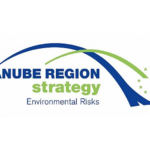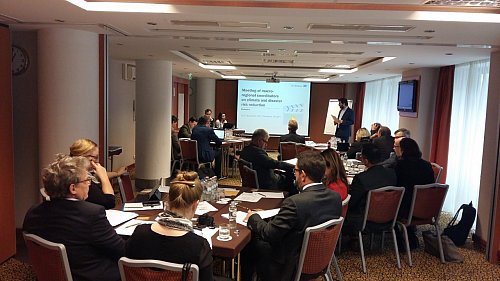DISCUSSION ON CLIMATE AND DISASTER RISK REDUCTION
The Joint meeting of macro-regions on climate and disaster risk was held in Budapest at the 16-17th of November 2017. The meeting was attended by the representatives of all four macro-regions of EU, DG REGIO, DG ECHO, DG CLIMA and the Interreg Danube Transnational Programme.
Participants get familiarized with the structure of each strategies and their focus on climate change and disaster risk issues. Coordinators represented their activities and project support on this field and also explained the future plans. Representative of DG ECHO highlighted the relevances of MRS and the Sendai Framework, from the side of DG CLIMA the revision of the EU Climate Change Adaptation Strategy was introduced waiting for comments from the macro-regional strategies side. A study on macro-regional strategies and cohesion policies and its main findings were summarized by DG REGIO and debated by the participants.
Experts agreed that the four macro-regional strategies of EU would like to represent their achievements and their relation with the EU Civil Protection Mechanism under a separate section during the forthcoming European Civil Protection Forum in Brussels expected at the 5-6th of March 2018. The coordination of EUSDR PA5 also invited the representatives of EUSALP to their next Steering Group Meeting which will be held in Vienna next month (13-14/12/2017).
An INTERACT report summarizes the meeting outcomes and future possibilities of macro-regional cooperation on climate and disaster risk reduction.
Agenda of the meeting with presentations:
16 November 2017
11.00 – 12.30 Registration and Welcoming lunch
12.30 – 13.00 Welcoming words
- Gabor Jenei, National Coordinator of the EUSDR, Hungary
- Andriy Martinenko, Interact
13.00 – 15.00 Experiences of coordinators: Challenges, achieved solutions and detected failures to address particular aspect in the macro-regional strategy
- Setting up governance structures for the implementation of priority (policy area,priority area,pillar, action)- Wolfgang Lexter, Action Group 8 To improve risk management and to better manage climate chenge, including major natural risks prevention Leader, EUSALP Inputs from all coordinators, discussion
- Involving relevart institutions and multi-level governance actors in implementation of priority (policy area, priority area, pillar, action). How to reach common agreement across the countries involved in the implementation of even more that one marco-regional strategy-Mitja Bricelj, Pillar 3`Environmental quality coordinator, EUSAIR
Inputs from other Coordinators, discussion
Objectives of the session: This session is aiming to present and reflect on shared aspects in implementation of macro-regional strategies. The aspect will be open up by one of the macro-regional coordinators, experiences by other coordinators with be shared through the discussion. Good practices will be identified and recorded.
15.00 – 15.30 Coffee break
15.30 – 17.30 Experiences of coordinators: Challenges, achieved solutions and detected failures to address particular aspect in the macro-regional strategy
- Defining focus of priority (policy area, priority area, pillar, action) and how to interlink the work of coordinator to the Agenda 2030 and relevant SDG – Krista Kampus Horizontal Action Climate Coordinator, EUSBSR & Janusz Gaciarz, Policy Area Secure Coordinator, EUSBSR
- Defining milestones to be achieved and monitoring of priority (police area, priority area, pillar, action) Karoly Gombas, priority Area 5 To manage environmental risks coordinators, EUSDRInputs from all coordinators, discussion
Objectives of the session: This session is aiming to present and reflect on shared aspects in implementation of macro-regional strategies. The aspect will be introduced by one of the macro-regional coordinators, experiences by other coordinators with be shared through the discussion. Good practices will be identified and recorded.
17.30 – 18.00 Summary of the discussions during the Day: Solutions to implementation and management aspects in macro-regional strategies
17 November 2017
08.30 – 09.00 Preliminary conclusions from DG REGIO study “Marco -regional strategies and their links with Cohesion policy Jean-Marc Venineaux, DG REGIO
09.00 – 09.30 EU Strategy on adaptation to climate change and its relevance for macro-regional apparoaches Andras Toth, DG CLIMA
09.30 – 10.00 Sendai Framework for DRR and EU macro-regional strategies -Karolina Kalinowska, DG ECHO
10.00 – 11.00 Key focus areas on climate and security during 2018 and 2019 in implementation of macro-regional strategy (governance aspects and thematic issues)
- Short presentations by coordinators (Tour de table)
- Potential for coordinating activities across macro-regional strategies-Krista Kampus,Horizontal Action Climate Coordinator, EUSBSR & Janusz Gaciarz, Policy Area Secure.
- Proposed questions for the discussion:
– Define platform for cooperation for climate change and civil security experts and explore possibilities of establishing a pan-European framework for the joint venture.
– Discuss most efficient ways of contributing to the achievement of 2030 Agenda and SDGs (with special focus on Goal 13 and Goal 16) by HA ‘Climate’ and PA ‘Secure’ joint initiatives.
– Explore possible ways of disseminating best practices in the area of prevention of natural disaster caused by climate change.
Objectives of the session: The session is aiming to present priorities for coordinators work in 2017 and 2018. Even more, during this session possibilities for coordinated activities across macro-regions in addressing relevant and shared issues/areas will be explored.
11.00 – 11.30 Coffee break
11.30 – 12.00 Interact capitalisation network for Climate change and risks-Manuel Gonzalez ,interact
Objectives of the session: This session will present Interact established network addressing climate change and risks thematic. Interreg programmes efforts and project achievements will be shortly presented.
12.00 – 13.30 Coordination and cooperation between macro-regional coordinators and (Interreg) programmes: 2014-2020 and post 2020 – Baiba Liepa, Interact
- All participants, discussion
Proposed questions for the discussion:
- How to support implementation of macro-regional projects?
- Synergies between macro-regional strategies (and their policy/priority areas), Interreg and EU programmes; open issues and proposals for financing transnational climate and disaster risk reduction projects.
- KEEP database: how the data from KEEP be used to build synergies and complementarities?
- EU Cohesion Policy post 2020 – how better to align EU financial instruments with
Objectives of the session: The session will be shortly kicked off by Interact presentation on what is a macro-regional project and Interreg experiences in coordination and cooperation. Short reference to KEEP database will be provided. The session would address concrete questions on how coordination and cooperation could be improved across programmes and between macro-regional coordinators and programmes.
13.30 – 13.45 Conclusions from the discussions and closing of the meeting – Satu Hietanen, Interact



